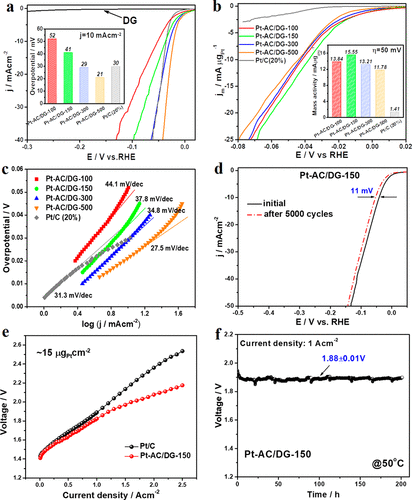Research Progress
Pt atomic clusters (Pt-ACs) display outstanding electrocatalytic performance because of their unique electronic structure with a large number of highly exposed surface atoms. However, the small size and large specific surface area intrinsically associated with ACs pose challenges in the synthesis and stabilization of Pt-ACs without agglomeration.
Motivated by such a challenge, a research team led by Prof. YANG Hui at Shanghai Advanced Research Institute (SARI) of the Chinese Academy of Sciences collaborated with Prof. DAI Liming at Case Western Reserve University of the United States reported a novel one-step carbon-defect-driven electroless deposition (ELD) method to produce ultrasmall but well-defined and stable Pt-ACs supported by defective graphene (Pt-AC/DG) structures. The research results were published in the Journal of the American Chemical Society entitled " Carbon-Defect-Driven Electroless Deposition of Pt Atomic Clusters for Highly Efficient Hydrogen Evolution”.
A theoretical simulation clearly revealed that the defective regions with a lower work function, and hence a higher reducing capacity, than that of normal hexagonal sites triggered the reduction of Pt ions preferentially at the defect sites.
Moreover, the strong binding energy between Pt and carbon defects effectively restricted the migration of spontaneously reduced Pt atoms to immobilize/stabilize the resultant Pt-ACs.
The prepared Pt-AC/DG catalysts exhibited superb electrocatalytic performance for the hydrogen evolution reaction (HER) with a greatly enhanced Pt utilization efficiency and stability with significantly reduced Pt usage compared with the use of commercial Pt/C catalysts.
Water electrolysis based on renewable energy is the key of hydrogen production. However, large usage of precious metal catalysts is the primary reason of high costs in HER. The study provides an ideal strategy for the future development of cost effective Pt-based catalysts for the HER and many other reactions.

Electrocatalytic performance of the prepared Pt-AC/DG catalysts (Image by Prof. YANG’s group)
Contact: YANG Hui
Shanghai Advanced Research Institute, Chinese Academy of Sciences
Email: yangh@sari.ac.cn





